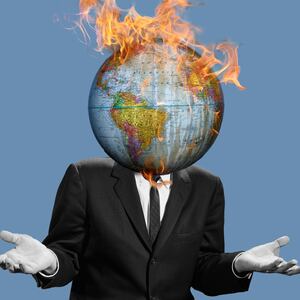The government quietly dropped a sweeping report on Friday that found the fingerprints of climate change on everything from infrastructure to the economy and warned that the world is already experiencing the effects, with more damage to come.
The timing of the report’s publication—at 2 p.m. ET on the Friday after Thanksgiving—was viewed by critics as a possible maneuver by the Trump administration to sidestep national attention on the crisis.
The 1,600-plus page document—produced by the National Climate Assessment, a consortium of 13 federal agencies overseen by the U.S. Global Change Research Program—is congressionally mandated and the first of its kind issued under the Trump administration. It’s the fourth volume produced by the group since 2000; the last report was issued in 2014.
The report frequently and unabashedly runs counter to the president and his administration’s stance on climate change, making damning statements about current policy and the economically devastating and even deadly impact these decisions are already having.
The report never names President Trump, who earlier this week tweeted about unusually frigid temperatures on the East Coast, with the mocking question: “Whatever happened to Global Warming?” He followed up with a tweet on Thanksgiving temperatures.
In his first two years in office, Trump has reversed environmental regulations and pulled out of the landmark Paris Accords that had sought international cooperation in reducing greenhouse gases by 2020. Just last month in an interview with 60 Minutes, Trump questioned if climate change was “man-made,” saying that the trend towards higher global temperatures “could very well go back.”
Here are six highlights from the report:
Climate change is already affecting the economy
The report details how phenomena from devastating hurricanes to simultaneous wildfires have already hurt the economy. By 2100, the report states that we could see huge economic losses from climate change: $141 billion from heat-related deaths, $118 billion from coastal flooding induced by sea levels rising, and $32 billion from infrastructure damage. But the authors say that’s minuscule compared to the damage the country will face if steps aren’t taken to mitigate the human impact on the climate. “Climate change is expected to cause growing losses to American infrastructure and property and impede the rate of economic growth over this century,” the report says.
CLIMATE CHANGE WILL MAKE THE U.S. LESS COMPETITIVE
The U.S.’s role in international trade could be disrupted in critical areas like agriculture, tourism, and the fishing industries, which have faced massive losses already from climate change. The problems faced by the power grid will likely lead to less efficient electricity usage in a time when increasing energy demands from wildly varying temperatures could make power critical and indeed life-saving. The report envisions a future where inefficient electrical usage and greenhouse gas levels prompt countries to seek out competitors outside the U.S. for their production needs, leading to “hundreds of billions of dollars” in losses by the end of the century— “more than the current gross domestic product (GDP) of many U.S. states.”
CLIMATE CHANGE IS ALREADY MAKING US SICKER
The report points to a series of increasingly harsh health effects from climate change that have spiked in the past couple generations and are almost certainly a result of more extreme temperatures. They include increasing rates of allergies, asthma, and hay fever. Climate change has also already broadened the array of pests and insects carrying deadly diseases: Zika, West Nile, and dengue fevers have already killed people outside what was thought to be their “normal” range. And it’s not just limited to physical effects: The report points to “lasting mental health consequences in affected communities” from economic degradation and relocation.
CLIMATE CHANGE WILL DISPROPORTIONATELY AFFECT MINORITIES
The economic upheaval and disease that comes with climate change will disproportionately affect those who cannot afford to move elsewhere where climate change effects are not as dangerous. These people include senior citizens, children, poorer communities, and minorities; indigenous and tribal communities are also at heightened risk. The report says that adaptation measures must specifically focus more on these communities or risk a substantial increase in “injuries, illnesses, and deaths from climate-related health outcomes.”

The Camp Fire burns along a ridge near Big Bend, California.
Stephen Lam/REUTERS / ReutersSAY GOODBYE TO CLEAN AIR AND WATER
The report notes that clean air and water are threatened by coastal flooding, unusual pollination, and changes in communities as they move and get displaced. Add to that more wildfires and insect-borne disease outbreaks from warmer temperatures, and clean air and water could be a thing of the past unless federal agencies address greenhouse gases. We’re already seeing the effects of the rapidly changing climate on our air and water with migration of species like fish and the spread of invasive species. Extinction is on the cards, and “future generations can expect to experience and interact with the natural environment in ways that are different from today.” That could change everything from tourism to national parks to simply going fishing on a lazy summer afternoon, with downstream effects to the communities that rely on nature for tourism and basic survival.
WE’RE AT A CRISIS POINT
The report repeatedly says that the time to act is now. Global warming is “transforming where and how we live and presents growing challenges to human health and quality of life, the economy, and the natural systems that support us,” the authors write. Without change, global warming will almost certainly cause “substantial damages to the U.S. economy, environment, and human health and well-being over the coming decades,” it warns.







